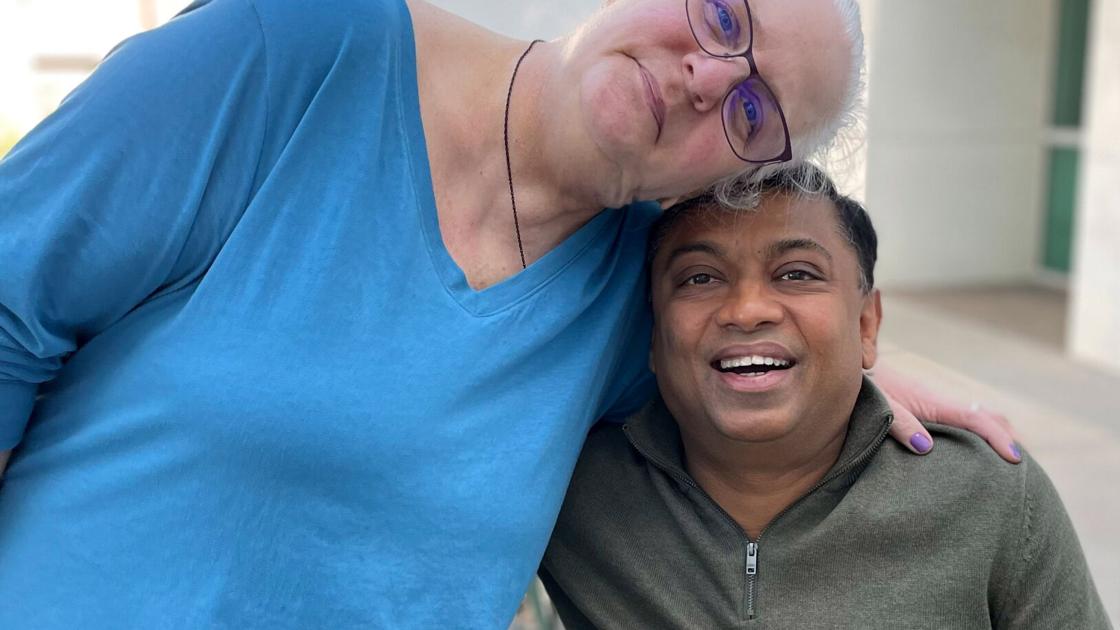Cindy Colbert lost her husband in March 2020, and a week later the world went dark.
With businesses closed and the pandemic lockdown in effect, Colbert says she sat at home and ate her feelings. As time passed and she gained weight, she found that she was in constant pain and became short of breath as she walked from room to room in her home.
During her annual physical in 2021, Colbert, who weighed more than 300 pounds, discussed her asthma and pain with her primary care physician, who asked if she was ready for action.
“For the first time I felt when she asked me if I was ready to do something, I was ready,” Colbert, 58, said. “I had come to this point and I couldn’t live like this anymore. I was ready to make these changes.”
Colbert was mentioned Banner-University Medical Center Tucson Clinical Weight Loss Programwhich aims to help people improve their health by promoting long-term lifestyle changes related to weight loss.
People also read…
Just over a year later, Colbert had lost 100 pounds and she continues to lose weight thanks to the changes she made.
The program, led by Dr. Amit Algotar, offers medical, psychological and behavioral support; nutritional assessment and advice; and an individualized exercise and training plan.
Banner officials say that while other doctors can prescribe weight-loss drugs, no other Tucson hospital has a multimodal program like theirs that offers surgical and nonsurgical weight-loss options. Over the past decade, it has helped thousands of people achieve their weight loss goals and improve their overall health and well-being.
“Being open is the most important thing”
The clinical weight-loss program, located at Banner-University of Arizona South, 2800 East Ajo Way, began as an employee wellness program, but by 2013 it was available to all patients, says Algotar, who joined in 2016.
It is open to non-smokers between the ages of 18 and 65 with a body mass index above 40 or above 35 and associated with diseases such as diabetes, who are not pregnant.
The program is covered by insurance with out-of-pocket costs determined by each person’s policy, Banner says. References are required.
Algotar called it a comprehensive medical bariatric program that involves a multitude of diet plans and medications as weight loss options. But it’s more than diet and exercise. Algotar and other providers review the patient’s full medical picture, including other diagnoses and mental health.

“Every patient is different. Every patient’s needs are different,” Algotar said. “We don’t have a cookie-cutter approach and we don’t hand out the same meal plans to everyone who walks through the door.”
The doctors who run the clinic are not surgeons, but they work with a surgical team. If participants are interested in bariatric surgery, their progress will be assessed after several months in the program to determine if surgery is an appropriate option.
Algotar said it’s about doing what works for the patient.
Cindy Colbert “was open to ideas. She was open to doing different things, open to research, open to finding new recipes,” Algotar said. “Being open is the most important thing in finding what works for the patient.”
After working together for a year and a half, Algotar and Colbert finally met in person in February, having conducted all of their sessions via Zoom. Algotar called the advancement of telemedicine the silver lining of the pandemic, as the program now serves patients statewide.
“Awareness has made a big change”
Colbert said the first time she met Algotar, he just asked her to pay attention to what she ate, including when, how much and how she felt.
“The first two weeks, just being mindful of what I was eating made me make some changes. Not necessarily what I was eating, but when I was eating,” Colbert said. “Even though I didn’t make any changes to my diet, I still started to lose weight because I wasn’t eating right before bed or eating a full bowl of nachos. This take of consciousness has made a great change.”
From there, Colbert reduced his carb intake to 50 grams per day. She started looking at the ingredients and changing the foods she ate.
“Basically, I had changed to eggs for breakfast, salad for lunch, and chicken with some kind of vegetable for dinner,” Colbert said. “I started losing weight pretty quickly based on my movements and because I was eating the right amount of food.”
Ten years ago, when Colbert first tried to lose weight, another doctor told her she needed to walk 30 minutes a day.
“I’m like, ‘I can’t even walk to the corner without it hurting, how am I supposed to do this for 30 minutes?'” she said.
But when Colbert first connected with Algotar, he suggested he walk through the house from room to room and make a circuit.
“He said, ‘If you’re tired or your back starts to hurt, sit down. You don’t have to do it all at once,’” Colbert said. “As long as you get up and move, you can move for 30 minutes a day in five-minute bursts.”
She began to follow his footsteps and find ways to get outside and walk while beating the summer heat.
“You get ready to go out and jog or lift weights, and that’s not all. Just get up and eat the right things and get moving,” she said. “Walk, run, swim, hike. Go to the zoo and walk around the zoo. It’s exercise. It doesn’t have to be strenuous.”
Colbert called Algotar her biggest cheerleader throughout her weight loss journey, saying he helped her stay on top of things and think about events that might affect the food she eats. eats, including holidays and family gatherings.
Thanks to the changes Colbert made in the program, she can be active and play with her grandchildren. She recently moved and, unlike last time, was able to help move boxes up and down uninterrupted.
“Last time, the only thing I could do was sit on my butt and make boxes,” she said.
His A1C – a blood test that measures average blood sugar levels over the past three months – fell below the diabetic threshold.
“A lot of old people think, ‘I can’t do it. I’m too old.’ It was one of the things I was thinking about,” Colbert said. “But you’re never too old. As long as you can move, you can do it.”
“A huge biology behind it all”
Algotar said that while Colbert’s approach worked for her, everyone is different, and every diet and exercise plan is different.
“For Cindy, the low-carb approach worked wonders. At the same time, for someone else, that might not be the approach,” Algotar said.
“They may work best with a low-calorie approach or an intermittent fasting approach or a time-restricted eating approach or a dash diet (to help treat or prevent high blood pressure) or a vegetarian diet. Each approach has its benefits. and its drawbacks and each approach might be useful for a different type of individual.”
Algotar, who has been researching obesity since 2003, said for many people, maintaining weight loss is the real challenge.
“It’s not just a matter of behavior, there’s a huge biology behind it. Our body hates losing weight and it’s because our body sees fat as an insurance policy against starvation,” he said. he declared. “A long time ago when…starvation was a real problem that could have wiped out our species.”
There are hormones that try to get a person to eat more as they gain weight, Algotar said, adding that the key is to stay focused and be aware of what’s going on.
“We don’t have a structured program, it’s just based on what they present and what the patient needs,” Algotar said. “If a patient is…like Cindy, we let them do their thing…and see them thrive, see them blossom, see them succeed.”
Algotar is also involved with the Arizona Obesity Organization, which works to help educate healthcare providers against bias and provide effective treatment.
“Often patients experience a lot of prejudice, a lot of negative attitudes, even from health care. The message is, ‘Eat less and exercise…and if you don’t, it’s ‘is your fault'” he said.
“For patients thinking about losing weight and thinking about trying to see what they can do, I don’t want them to feel defeated in any way because there is hope, there are options.”
Get a roundup of solutions reports from the Arizona Daily Star at linktr.ee/starsolutions. Video by Caitlin Schmidt/Arizona Daily Star.
Contact star reporter Caitlin Schmidt at 573-4191 or [email protected].
